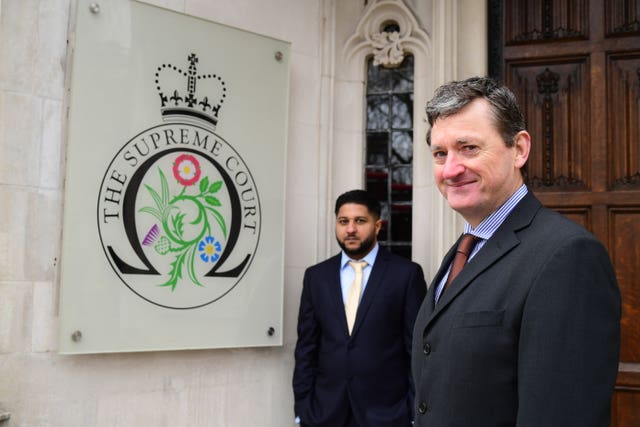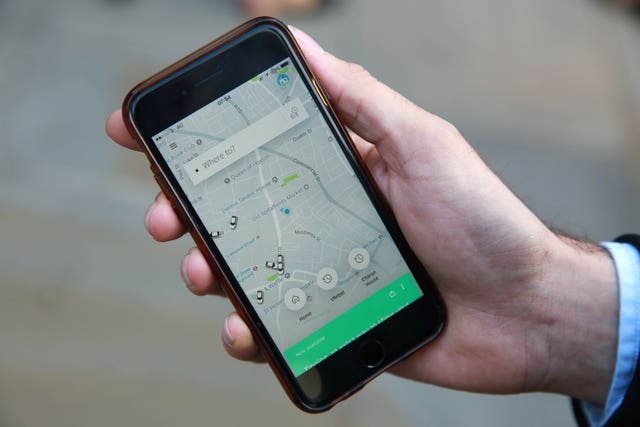A decision by Uber to give its drivers a guaranteed minimum wage, holiday pay and pensions “opens the door” for other workers in the gig economy to get better pay and conditions, unions have said.
The ride-hailing giant announced that, from Wednesday, more than 70,000 drivers will now to be treated as workers under UK employment law.
The move, following lengthy legal action, was welcomed by unions representing hundreds of thousands of workers in the growing gig economy.
“Gig workers deserve the same basic rights as everybody else”
Mick Rix, national officer of the GMB union, told the PA news agency: “Uber’s announcement should mark the end of the road for bogus self-employment.
“GMB’s battle with Uber now opens the door for workers, and their unions, to win the fight for better pay and conditions at companies across the gig economy.”
TUC general secretary Frances O’Grady told PA that Uber’s announcement was the result of years of union campaigning, adding: “Now we need to take it to the next level.
“We will be pushing hard for Uber and other platform companies to recognise unions and give staff a proper voice at work.
“Gig workers deserve the same basic rights as everybody else.
“Unions won’t rest until pay and conditions have improved across the gig economy.
“And we’ll keep the pressure up on the government to use its long-delayed employment bill to crackdown on insecure work.”
“This is a step in the right direction but we are not there yet”
Uber sent out an email on Wednesday to its customers which said: “From today Uber drivers in the UK will be paid holiday time, automatically enrolled into a pension plan, and guaranteed to earn at least the National Living Wage.
“Drivers are an essential part of our everyday lives and we are proud to be making these changes to how they earn with Uber.”
Former Uber driver James Farrar said minimum wage, holiday pay and pensions were a step in the right direction but drivers were still being short-changed.
Farrar, who along with Yaseen Aslam originally brought claims against the firm, told the PA news agency that drivers should accrue minimum wage and holiday pay from when they log in not just from when a trip is accepted.
He added: “This means about 40-50% of your working time is still not being paid or protected even though the law requires it does.
“If you go to work for Starbucks and no customers come into the shop should you still be paid, of course you should.
“Uber simply has to do this, this is not difficult to understand.
“Waiting is working.
“This is a step in the right direction but we are not there yet.”
Jamie Heywood, Uber’s regional general manager for Northern and Eastern Europe, described it as “an important day” for drivers in the UK.
It comes a month after the Uber firm lost a legal battle in the UK, begun in 2016, over drivers’ status.
Drivers said they were workers whereas Uber operating companies said drivers were contractors, not workers.

“It should not have taken five years of court battles for drivers to get basic rights at work”
The Supreme Court ruling defined Uber drivers as workers, prompting lawyers to say it meant they would be entitled to workers’ rights such as holiday pay and compensation for lost pay.
Uber, which was launched in the UK in 2012, said its drivers will now earn at least the national living wage after accepting a trip request and after expenses.
On average, its drivers earn £17 per hour in London and £14 in the rest of the UK.
All drivers will receive holiday time based on 12.07% of their earnings, which will be paid out on a fortnightly basis.
They will be automatically enrolled in a pension scheme.

A spokesman for law firm Leigh Day, which represents more than 4,000 Uber drivers in workers’ rights claims, said: “This is an important decision, not just for the Uber drivers who have been fighting for workers’ rights for over five years, but for the whole of the gig economy.”
Andy McDonald, shadow employment rights and protections secretary, said the Government needed to urgently introduce legislation to clarify the position of all gig economy workers.
“This announcement is testament to the hard work of the GMB trade unions and drivers, but it should not have taken five years of court battles for drivers to get basic rights at work.
“The Supreme Court ruling sent a clear message that companies should not game the system by undercutting the rights of their employees. Gig economy workers under similar arrangements across the economy must now also be recognised as workers.
“The Government must not leave it to low-paid and precarious workers to spend time and money they can ill afford to fight for their rights in the courts.”


















